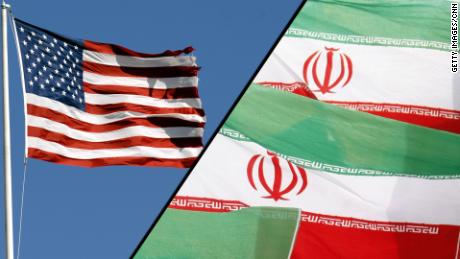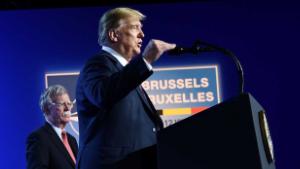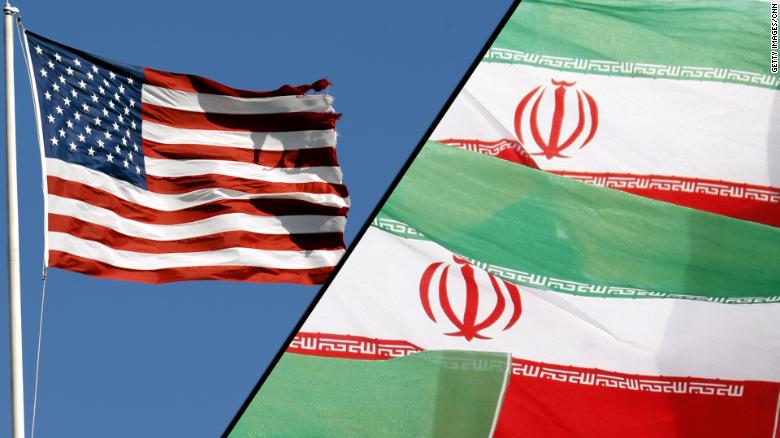Trump's irritation with top aides grows over Iran strategy
President Donald Trump has become irritated at an emerging impression his hawkish national security advisers are marching him closer to war with Iran despite his isolationist tendencies, according to people familiar with the matter.
Instead, Trump is signaling his intent to speak with the Iranians as tensions rise in the Persian Gulf, and his national security team has taken steps they hope could facilitate a new diplomatic opening.
The likelihood of such an opening appears slim. But Trump has raised concern with the heightened rhetoric, believing a large-scale military intervention with Iran would be devastating to him politically, people familiar with the situation said. The President has told members of his team that starting a new conflict would amount to breaking his campaign promise to wind down foreign entanglements. And he's chafed at suggestions his aides, led by national security adviser John Bolton, are somehow leading him to war.
As recently as last week, Trump was calling outside advisers to complain about Bolton, people familiar with the conversations said. Trump is frustrated that Bolton has allowed the Iran situation to reach a point where it seems like armed conflict is a real possibility, but his frustrations with his national security adviser actually began earlier this spring over Venezuela, when a similar dynamic -- Bolton and other aides openly hinting at military options -- caused Trump to warn his team to tamp down the rhetoric.
As tensions with Iran have escalated over the past week, National Security Council officials close to Bolton were initially dismissive of the need to draw up deescalation options, including during a meeting late last week with State and Pentagon officials.
But in a follow-up session on Wednesday with the same group, those NSC officials were singing a different tune, according to an administration official. Instead, the officials asked the Pentagon to draw up additional deterrence and deescalation options for the President to review, according to an administration official.
Trump denied on Wednesday there was any "infighting" over his Middle East policy. But he reiterated his desire to open talks with Iran, a wish he's been advocating heavily in meetings over the past week.
"Different opinions are expressed and I make a decisive and final decision - it is a very simple process. All sides, views, and policies are covered," he tweeted. "I'm sure that Iran will want to talk soon."
'He will make the decision'
US narrative on Iran questioned as allies call for 'restraint'
Sarah Sanders, the White House press secretary, denied Thursday there were any divisions inside the administration over Iran. But she made clear that Trump's views would prevail.
"The President is the ultimate decision maker and he's going to take all of the information and intelligence that is given to him and he will make the decision that he thinks is best to keep Americans safe. It's that simple," she told reporters. "There's only one person that was elected to make those decisions and that was the President. He'll be the one that decides."
Even as Trump indicates he wants to cool tensions with Iran, it was his desire to withdraw from the Iran nuclear deal and ramp up sanctions on Iran -- against the advice of his earlier national security advisers -- that has brought Trump closer to the precipice of conflict with Iran.
Trump has directed aides in recent months to tighten the vises on Iran's economy, believing that he could pressure Iran's leaders to negotiate a better nuclear deal with him. But while that pressure strategy has done damage to Iran's economy, it has done more to back Iran into a corner -- and caused it to lash out -- rather than draw it back to the negotiating table.
Now, Trump is taking more active steps to open diplomatic channels. On Thursday, Trump will meet with the president of the Swiss government in order to try to establish a channel with which he can speak to Iranians as tensions between the country and the US heighten, according to a person familiar with ongoing discussions inside the White House.
Trump will meet with Ueli Maurer, the Swiss government president, at the White House to discuss the nations' relationship and "matters such as Switzerland's role in facilitating diplomatic relations and other international issues," the White House said in a statement.
The US and Iran do not have an official diplomatic relationship, but Switzerland serves as the protecting power for the US in the country. That means they represent US interests in Iran, performing services for US citizens in the country like visa processing. They also serve as a channel for diplomacy between the two nations though there are other mechanisms for the two nations to communicate.
Last week, after Trump publicly appealed to Iran to call him amid heightened tensions with Tehran, the White House contacted the Swiss to share a phone number the Iranians could call the President on, according to a diplomatic source familiar with the move.
The source said the Swiss likely won't hand over the number unless the Iranians specifically ask for it and it's thought they are highly unlikely to do so. White House officials say Trump's overtures are sincere.
Secretary of State Mike Pompeo, even though he is an Iran hawk, has also pressed to open up diplomatic channels with Iran. The top Trump administration hostage negotiator sent a letter to Iran earlier this year saying that the US would enter into negotiations on prisoners if Iran released the ailing 82-year-old Baquer Namazi. The Iranians rejected the offer, saying they would not meet with any preconditions. Since then, the more muscular militaristic approach has been adopted.
The Iranians have thus far shown no public willingness to speak to Trump, and Supreme Leader Ali Khamenei said this week that negotiations with the US would be akin to "poison."
Trump has been advocating heavily for some type of diplomatic contact behind the scenes, even as his national security team scales up its rhetoric on Iran and weighs military options.
Latest developments

Iran tensions spotlight Trump's questionable credibility 0
Last week, the Pentagon positioned an aircraft carrier strike group and B-52 bombers in the region, and the White House has updated war plans to include the deployment of more than 100,000 US troops to the Middle East in the event that Iran strikes American forces in the region or speeds up its development of nuclear weapons.
On Wednesday, the US announced it was ordering a partial evacuation of the US embassy in Baghdad and the US consulate in Erbil, Iraq, based on new threats in the region.
A number of US allies have questioned the response to the new intelligence, however, and have not ordered similar evacuations of their diplomatic compounds. Even within the US administration, officials describe an increasing level of concern in recent months among career staffers at the direction of the Trump administration's Iran policy.
Bolton and his coterie of Iran hawks at the NSC have been pushing for "action for action's sake," one administration official involved in the discussions said, without a clear strategy or set of goals. The concern is that there is simply a desire to scale up the pressure on Iran, escalating tensions with no clear off-ramp. Before re-entering government as Trump's national security adviser, Bolton openly advocated for regime change in Iran.
Now, there is serious wariness emerging over Bolton among Trump's circle of outside advisers, who enjoys open-door access to the President and spends hours with him each day.
"We need to be careful of his judgment," one of Trump's outside advisers said of the national security adviser.
Another adviser said Trump has "no interest in doing that at all" when it comes to getting into a military conflict with Iran.
Trump campaigned heavily in 2015 and 2016 against becoming involved in foreign wars, and lambasted President George W. Bush's decision to invade Iraq, later determined to be based on faulty intelligence about weapons of mass destruction. Bolton was serving as Under Secretary of State for Arms Control and International Security at the time.
Bolton's penchant for ratcheting up tensions has at times caused anxiety in other areas of the administration, according to people familiar with the matter. The former Fox News pundit enjoys an open-door policy with the President and spends more time with him than any other member of the national security team, those sources said.
Trump was initially hesitant to put Bolton in his national security realm in an official capacity. Instead, the man with the distinguishable mustache was often seen walking past the cameras on the White House driveway and into the West Wing for routine foreign policy meetings with the President. When Trump finally did hire Bolton, Trump directed aides to tell people Bolton promised him he wouldn't start any wars. Trump regularly jokes to world leaders, ambassadors and military officers that Bolton wants to invade countries and start wars.
Those hawkish tendencies and easy access to Trump have sometimes left other members of Trump's foreign policy circle scrambling. Last year, Bolton's request for military options for Iran caused concern among some Pentagon officials, sources tell CNN.
The dynamic wasn't as pronounced when key administration posts were filled with officials viewed as steadying forces -- such as former Defense Secretary James Mattis or former Secretary of State Rex Tillerson -- according to the people familiar with the matter. But with those officials gone, Bolton has appeared to have a freer hand -- leaving some officials at the State Department and the Pentagon mindful of taking steps that would keep him in check.
Pompeo and Bolton have a strained relationship, people familiar with it say, even though they are largely alined on policy. Both are hawkish, but Pompeo believes he is more deft and diplomatic in his approach, according to the sources. The secretary of state often rolls his eyes when he is asked about Bolton.
Trump, meanwhile, has long chafed at any suggestion his decisions or actions are being manipulated or orchestrated by someone other than himself. Asked last week about Bolton in light of recent turmoil in Venezuela, North Korea and Iran -- all places where the US has taken a strong stand without much progress -- Trump said his national security adviser has "strong views" but that "I actually temper John."
News Courtesy: www.cnn.com












